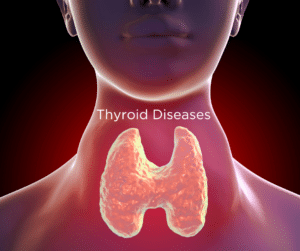Thyroid diseases are disorders affecting the thyroid gland that disrupt one or more of the gland’s primary functions. The thyroid gland is an essential organ for producing thyroid hormones which regulate metabolic processes.
Specific types of thyroid diseases include the following:
- Hypothyroidism
- Hyperthyroidism
- Goiter
- Thyroid nodules
- Thyroid cancer
In this post I’ll discuss the various types of diseases in more detail, including symptoms and treatments.

Types Of Thyroid Diseases
Hypothyroidism
Hypothyroidism results when the thyroid gland produces an insufficient amount of thyroid hormone. Symptoms of hypothyroidism can affect an individual both physically and mentally.
Hypothyroidism can include physical symptoms such as fatigue, fluid retention, muscle and joint pain, dry skin, and constipation. Mental symptoms, such as depression, can also develop.
Hyperthyroidism
The opposite of hypothyroidism, hyperthyroidism results when there’s an excessive production of thyroid hormone. This is less common than hypothyroidism, but still something you should be aware of.
Hyperthyroidism leads to an increased metabolism, which can lead to a number of other symptoms. In mild cases of hyperthyroidism you may not even notice any symptoms. However, when symptoms are noticeable, they can include:
- Tremor
- Nervousness
- Fast heart rate
- Fatigue
- Intolerance for heat
- Increase in bowel movements
- Increased sweating
- Concentration problems
- Unintentional weight loss
Goiter
A goiter simply refers to an enlarged thyroid gland, regardless of cause. A goiter is not one of the thyroid diseases per se, but can be a sign of a more serious condition. However, a goiter may be associated with hypothyroidism, hyperthyroidism, or normal thyroid function.
Thyroid Nodules
Thyroid nodules refer to lumps or abnormal masses within the thyroid. Nodules are not necessarily a cause for concern, as they can be caused by benign cysts or benign tumors. Although less commonly they may be caused by cancers of the thyroid.
Nodules may be single or multiple and can vary in size. If nodules are excessively large, they may cause symptoms related to compression of nearby structures. Some nodules actively secrete hormone while others do not.
Thyroid Cancer
Thyroid cancer is a condition that is more likely to affect adult woman than either men or youth. Two thirds of cases occur in people under age 55. The type of thyroid cancer is dependent upon the specific cell type within the thyroid that has become cancerous. When diagnosed early, most cases of thyroid cancer have a good prognosis and high survival rate.
Diagnosing Thyroid Diseases
Thyroid diseases are usually detected during physical examinations, but specialized tests can be conducted to diagnose them as well. Blood tests can be conducted to measure your levels of thyroid hormone, and imaging tests can be conducted to detect any enlargement in the thyroid gland.
If you suspect you’re afflicted with any of the above mentioned thyroid diseases, get an evaluation right away. It’s always best to detect these kinds of things early.
Treatment For Thyroid Diseases
Thyroid diseases can be treated by medications. In other cases surgery may be required. Treatment will depend on the particular thyroid disease.
Medications can be prescribed to either increase or decrease your production of thyroid hormone. Other medications can also be given to treat symptoms, such as increased heart rate, that result from thyroid diseases.
Sometimes thyroid surgery will be needed to remove a large goiter or a hyperfunctioning nodule within the gland. Surgery is necessary when thyroid cancer is diagnosed.
With proper medical treatment, thyroid disorders can be well managed and are not life threatening. As mentioned earlier, the outlook for most people with thyroid cancer is also good.
With that being said, conditions will not clear up without treatment, so please apply for a clarity call as soon as possible if you believe you have one of these thyroid diseases.





She is a recognized and award-winning holistic, functional, integrative and anti-aging healthcare practitioner, speaker and author, and has been featured in ABC News, Forbes, WOR Radio and many media outlets to spread the word that you can live younger and healthier at any age.